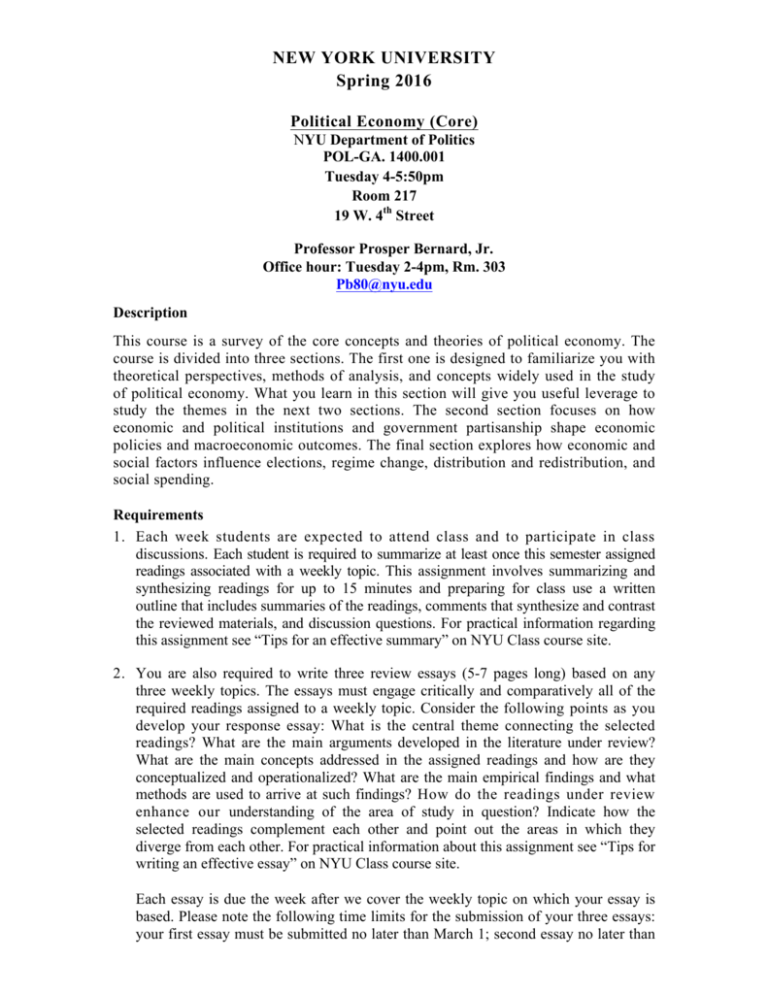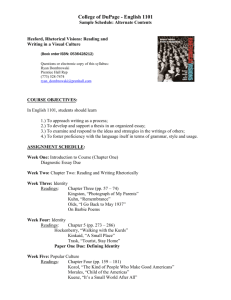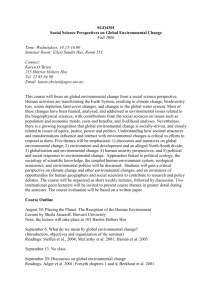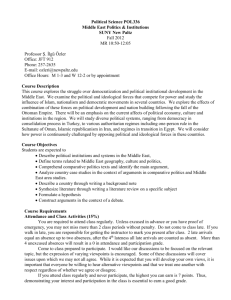NEW YORK UNIVERSITY Spring 2016 - Department of Politics, New
advertisement

NEW YORK UNIVERSITY Spring 2016 Political Economy (Core) NYU Department of Politics POL-GA. 1400.001 Tuesday 4-5:50pm Room 217 19 W. 4th Street Professor Prosper Bernard, Jr. Office hour: Tuesday 2-4pm, Rm. 303 Pb80@nyu.edu Description This course is a survey of the core concepts and theories of political economy. The course is divided into three sections. The first one is designed to familiarize you with theoretical perspectives, methods of analysis, and concepts widely used in the study of political economy. What you learn in this section will give you useful leverage to study the themes in the next two sections. The second section focuses on how economic and political institutions and government partisanship shape economic policies and macroeconomic outcomes. The final section explores how economic and social factors influence elections, regime change, distribution and redistribution, and social spending. Requirements 1. Each week students are expected to attend class and to participate in class discussions. Each student is required to summarize at least once this semester assigned readings associated with a weekly topic. This assignment involves summarizing and synthesizing readings for up to 15 minutes and preparing for class use a written outline that includes summaries of the readings, comments that synthesize and contrast the reviewed materials, and discussion questions. For practical information regarding this assignment see “Tips for an effective summary” on NYU Class course site. 2. You are also required to write three review essays (5-7 pages long) based on any three weekly topics. The essays must engage critically and comparatively all of the required readings assigned to a weekly topic. Consider the following points as you develop your response essay: What is the central theme connecting the selected readings? What are the main arguments developed in the literature under review? What are the main concepts addressed in the assigned readings and how are they conceptualized and operationalized? What are the main empirical findings and what methods are used to arrive at such findings? How do the readings under review enhance our understanding of the area of study in question? Indicate how the selected readings complement each other and point out the areas in which they diverge from each other. For practical information about this assignment see “Tips for writing an effective essay” on NYU Class course site. Each essay is due the week after we cover the weekly topic on which your essay is based. Please note the following time limits for the submission of your three essays: your first essay must be submitted no later than March 1; second essay no later than 2 April 5; and third essay no later than May 10.Your three essays (Word formatted) must be submitted via the Assignment Tool on NYU Class. 3. Finally, the course requires that you complete a take home exam at the end of the semester. The exam will be distributed on April 19 and due by May 3. Your exam must be submitted via the Assignment Tool on NYU Class course site. Grading Three review essays: 60% Take home exam: 15% Class participation: 15% In-class summary: 10% Readings There are several books and many articles required for this course. Below, you will find a list of books available for purchase at the bookstore; these books are also on reserve. Readings in the form of book chapters are available at the Bobst reserve desk. Readings in the form of journal articles are available through Bobst Electronic Journals. Jon Elster. 1989. Nuts and Bolts for the Social Sciences. New York: Cambridge University Press. William Keech. 2014. Economic Politics in the United States: The Costs and Risks of Democracy. Second Edition. New York: Cambridge University Press. January 26: What is Political Economy? Suggested Readings: James Alt and Alec Crystal. 1983. Political Economics (University of California Press): Chapter 1. James Caporaso and David Levine. 1992. Theories of Political Economy (Cambridge University Press): Chapter 1. Torun Dewan and Kenneth Shepsle. 2008. “Review Article: Recent Economic Perspectives on Political Economy, Part I & II,” British Journal of Political Science 38 (Spring 2008): 363-382 and (Summer): 543-564. Adam Przeworski. 2003. States and Markets: A Primer in Political Economy (Cambridge University Press): Chapter 1. Charles Wolf, Jr. 1993. Markets or Governments: Choosing between Imperfect Alternatives (The MIT Press): Chapter 1. Part I: Concepts and Perspectives in Political Economy February 2: Rational Choice and Collective Action Assigned Readings Samuel Bowles and Herbert Gintis. 2008. “The Evolutionary Basis of Collective Action.” In Barry Weingast and Donald Wittman, eds., The Oxford Handbook of Political Economy. New York: Oxford University Press: Jon Elster. 1989. Nuts and Bolts for the Social Sciences. New York: Cambridge University Press. 3 Suggested Readings Mancur Olson. 1971. The Logic of Collective Action: Public Goods and The Theory of Groups (Harvard University Press). Donald Green and Ian Shapiro. 1994. Pathologies of Rational Choice Theory (Yale University Press). Margaret Levi. 1990. The Limits of Rational Choice Theory. (University of Chicago Press). Margaret Levi. 2000. “The Economic Turn in Comparative Politics,” Comparative Political Studies 33 (August/September): 822-44. Adam Przeworski. 1985. “Marxism and rational choice,” Politics and Society 14: 379-409. February 9: Preference Formation and Interest Representation Assigned Readings Michael Hiscox. 2001. “Class Versus Industry Cleavages: Inter-Industry Factor Mobility and the Politics of Trade,” International Organization 55 (Winter): 1-46. Yotam Margalit. 2013. “Explaining Social Policy Preferences: Evidence from the Great Recession.” American Political Science Review 107 (February): 80-103. William Mitchell and Michael Munger. 1991. “Economic Models of Interest Groups: An Introductory Survey.” American Journal of Political Science 35 (May): 512-546. Mancur Olson. 1982. The Rise and Decline of Nations: Economic Growth, Stagflation, and Social Rigidities. New Haven: Yale University Press: chapters 2-3. Suggested Readings Scott Ainsworth. 2002. Analyzing Interest Groups: Group Influence on People and Policies (W.W. Norton). Ira Katznelson and Barry Weingast. 2007 Preferences over Time. (Russell Sage Foundation). Anne Krueger. 1973. “The Political Economy of Rent Seeking Society,” American Economic Review 64: 291-303. Moses Shayo. 2009. “A Model of Social Identity with an Application to Political Economy,” American Political Science Review 103 (May): 147-174. Kenneth Shepsle. 2010. Analyzing Politics: Rationality, Behavior, and Institutions. (WW Norton). February 16: Transaction Costs, Time-Consistency & Agency Problems Assigned Readings Gary Miller. 2005. “The Political Evolution of Principal-Agent Models,” Annual Review of Political Science 8: 203-225. Avinash Dixit. 1998. The Making of Economic Policy: A Transaction Cost Politics Perspective (The MIT Press): 19-112. Suggested Readings Torsten Persson and Guido Tabellini. 2002. Political Economics: Explaining Economic Policy. (The MIT Press). 4 Adam Przeworski. 2003. States and Markets: A Primer in Political Economy (Cambridge University Press): Chapter 5, 6, &7. Oliver Williamson. 1985. The Economic Institutions of Capitalism: Firms, Markets, and Relational Contracting (Free Press). February 23: Institutional Coordination, Complementarity & Change Assigned Readings Peter Hall and David Soskice. 2001. “An Introduction to Varieties of Capitalism” in Peter Hall and David Soskice, eds., Varieties of Capitalism. Oxford University Press: 1-44. Link: http://www.people.fas.harvard.edu/~phall/VofCIntro.pdf Wolfgang Streeck and Kathleen Thelen. 2005. “Introduction: Institutional Change in Advanced Political Economies.” In Wolfgang Streeck and Kathleen Thelen, eds., Beyond Continuity: Institutional Change in Advanced Political Economies. New York: Oxford University Press: 1-39. Peter Hall and Daniel Gingerich, “Varieties of Capitalism and Institutional Complementarities in the Political Economy: An Empirical Analysis,” British Journal of Political Science 39 (July 2009): 449-482. Margarita Estevez-Abe, Torben Iversen, and David Soskice, “Social Protection and the Formation of Skills: A Reinterpretation of the Welfare State,” in Peter Hall and David Soskice, eds., Varieties of Capitalism (New York: Oxford University Press, 2001). Suggested Readings Bob Hancke. 2009. Debating Varieties of Capitalism: A Reader (Oxford University Press). Jack Knight. 1992. Institutions and Social Conflict (Cambridge University Press). James Mahoney and Kathleen Thelen. 2010. Explaining Institutional Change: Ambiguity, Agency, and Power (Cambridge University Press). Douglass North. 1990. Institutions, Institutional Change, and Economic Performance (Cambridge University Press). Paul Pierson. 2004. Politics in Time: History, Institutions, and Social Analysis (Princeton University Press). Part II: Effects of Institutions and Politics on Economic Policies and Performance March 1: Economic Institutions Assigned Readings J. Lawrence Broz and Michael Plouffe. 2010. “The Effectiveness of Monetary Policy Anchors: Firm-Level Evidence.” International Organization 64 (Fall 2010): 695-717. David Cameron. 1984. “Social Democracy, Corporatism, Labour Quiescence and the Representation of Economic Interest in Advanced Capitalist Society.” In John Goldthorpe, ed., Order and Conflict in Contemporary Capitalism: Studies in the Political Economy of Western European Nations. New York: Oxford University Press: 143-174. 5 Robert Franzese and Peter Hall. 2000. “Institutional Dimensions of Coordination Wage Bargaining and Monetary Policy.” In Torben Iversen and Jonas Pontusson, eds., Unions, Employers, and Central Banks. New York: Cambridge University Press: Pablo Beramendi and Thomas Cusack. 2008. “Economic Institutions, Partisanship, and Inequality.” In Pablo Beramendi and Christopher Anderson, eds, Democracy, Inequality, and Representation. New York: Russell Sage Foundation: 127-168. Suggested Readings Barry Eichengreen and Torben Iversen. 1999. “Institutions and Economic Performance: Evidence from the Labour Market.” Oxford Review of Economic Policy 15: 121-138 Lars Calmfors and John Driffill. 1998. “Bargaining structure, corporatism, and macro-economic performance.” Economic Policy (April): 13-61. Torben Iversen. 1999. Contested Economic Institutions (New York: Cambridge University Press). Isabela Mares. 2006. Taxation, Wage Bargaining, and Unemployment (New York: Cambridge University Press). Alan Siaroff. 1999. “Corporatism in 24 industrial democracies: Meaning and measurement,” European Journal of Political Research 36: 175-205. Kathleen Thelen. 2002. “The Political Economy of Business and Labor in the Developed Democracies,” in Ira Katznelson and Helen Milner, Political Science: The State of the Discipline (New York: W.W. Norton). March 8: Political Institutions Assigned Readings Jude Hays. 2003. “Globalization and Capital Taxation in Consensus and Majoritarian Democracies.” World Politics 56 (October): 79-113. Torben Iversen and David Soskice. 2006. “Electoral Institutions and the Politics of Coalitions: Why Some Democracies Redistribute More Than Others.” American Political Science Review 100 (May): 165-181. William Keech. 2014. Economic Politics in the United States: The Costs and Risks of Democracy. Cambridge University Press: Chapters 8 and 9. Torsten Persson and Guido Tabellini. 2004. “Constitutions and Economic Policy.” Journal of Economic Perspectives 18 (Winter): 75-98. Suggested Readings Daron Acemoglu and James Robinson. 2012. Why Nations Fail: Origins of Power, Prosperity, and Poverty (Crown Business). Torsten Persson and Guido Tabellini. 2005. The Economic Effects of Constitutions (The MIT Press). Jonathan Rodden and Erik Wibbels. 2010. “Fiscal Decentralization and the Business Cycle: An Empirical Study of Seven Federations,” Economic and Politics (March): 3767. George Tsebelis. 2002. Veto Players: How Political Institutions Work (Princeton University Press). 6 March 15 – No Class (Spring Recess) March 22: Macroeconomic Politics: Electoral Cycles Assigned Readings William Robert Clark, Sona Golder, and Paul Poast. 2013. “Monetary Institutions and the Political Survival of Democratic Leaders.” International Studies Quarterly 57 (September): 556-567. William Roberts Clark and Mark Hallerberg. 2000. “Mobile Capital, Domestic Institutions, and Electorally Induced Monetary and Fiscal Policy.” American Political Science Review 94 (June): 323-346. Brandice Canes-Wrone and Jee-Kwang Park. 2012. “Electoral Business Cycles in OECD Countries.” American Political Science Review 106 (February): 103-122. William Keech. 2014. Economic Politics in the United States: The Costs and Risks of Democracy. Cambridge University Press: Chapter 3. Suggested Readings Alberto Alesina, Nouriel Roubini, and Gerald Cohen. 1997. Political Cycles and the Macroeconomy (The MIT Press). Allan Drazen. 2001. “The Political Business Cycle after 25 Years.” In Ben Bernanke and Kenneth Rogoff, eds., NBER Macroeconomics Annual 2000, Vol. 15. (The MIT Press). Robert Franzese. 2002. Macroeconomic Policies of Developed Democracies (New York: Cambridge University Press). Finn Kydland and Edward Prescott. 1977. “Rules rather than discretion: The Inconsistency of Optimal Plan.” Journal of Political Economy 85 (June): 473-90. March 29: Macroeconomic Politics: Partisanship Assigned Readings Pablo Beramendi and David Rueda. 2007. “Social Democracy Constrained: Indirect Taxation in Industrialized Democracies.” British Journal of Political Science 37, 619641. Carles Boix. 1997. “Political Parties and the Supply Side of the Economy: The Provision of Physical and Human Capital in Advanced Economies, 1960-90.” American Journal of Political Science 41 (July): 814-945. Thomas Cusack. 1999. “Partisan Politics and Fiscal Policy,” Comparative Political Studies 32 (June): 464-486. William Keech. 2014. Economic Politics in the United States: The Costs and Risks of Democracy. Cambridge University Press: Chapter 4. Suggested Readings Carles Boix. 1998. Political Parties, Growth, and Equality. Conservative and Social Democratic Strategies in the World Economy (Cambridge University Press). 7 William Roberts Clark and Vincent Arel-Bundock. 2013. “Independent but not Indifferent: Partisan Bias in Monetary Policy at the Fed.” Economics and Politics 25 (March): 1-26. Douglass Hibbs. 1977. “Political Parties and Macroeconomic Policies,” American Political Science Review 71 (December): 1467-87. David Rueda. 2007. Social Democracy Inside Out: Partisanship and Labor Market Policy in Industrialized Democracies (Oxford University Press). Part III: The Effects of the Economy and Society on Politics April 5: Economic Voting Assigned Readings Christopher Anderson. 2007. “The End of Economic Voting? Contingency Dilemmas and the Limits of Democratic Accountability.” Annual Review of Political Science 10: 27196. Larry Bartels. 2014. “Ideology and Retrospection in Electoral Responses to the Great Recession.” In Nancy Bermeo and Larry Bartels, eds., Mass Politics in Tough Times: Opinions, Votes, and Protest in the Great Recession (Oxford University Press): 185-223 Timothy Hellwig and David Samuels. 2007. “Voting in Open Economies: The Electoral Consequences of Globalization.” Comparative Political Studies (March): 283-306. Matthew Singer and Ryan Carlin. 2013. “Context Counts: The Electoral Cycle, Development, and the Nature of Economic Voting.” The Journal of Politics 75 (July): 730-742. Suggested Readings Jonathan Rodden and Erik Wibbels. 2010. “Dual Accountability and the nationalization of party competition: Evidence from four federations.” Party Politics 17 (September): 629-653. Raymond Duch and Randolph Stevenson. 2008. The Economic Vote: How Political and Economic Institutions Condition Election Results (Cambridge University Press). Michael Lewis-Beck and Mary Stegmaier. 2000. “Economic Determinants of Electoral Outcomes.” Annual Review of Political Science 3: 183-219. David Samuels and Timothy Hellwig. 2010. “Elections and Accountability for the Economy: A Conceptual and Empirical Reassessment.” Journal of Elections, Public Opinion, & Parties 20 (November): 393-419. April 12: Democratization Assigned Readings Daron Acemoglu and James Robinson. 2006. Economic Origins of Dictatorship and Democracy. Cambridge University Press: 1-87. Carles Boix. 2011. “Democracy, Development, and the International System.” American Political Science Review 105 (4): 809-828. Robert R. Kaufman. 2009. “The Political Effects of Inequality in Latin America: Some Inconvenient Facts.” Comparative Politics (April): 359-377. 8 Suggested Readings Carles Boix. 2003. Democracy and Redistribution (Cambridge University Press). Margaret Levy. 1988. Of Rule and Revenue (Berkeley: University of California Press). Seymour Martin Lipset. 1959. “Some Social Requisites of Democracy: Economic Development and Political Legitimacy.” American Political Science Review 53: 69-105. Adam Przeworski, Michael Alvarez, José Antonio Cheibub, and Fernando Limongi. 2000. Democracy and Development: Political Institutions and Well-Being in the World, 1950-1990 (New York: Cambridge University Press). Dietrich Rueschemeyer, Evelyne Huber Stephens, and John Stephens. 1992. Capitalist Development and Democracy (Chicago: University of Chicago Press). April 19: Welfare State Assigned Readings Gosta Esping-Andersen. 1993. The Three Worlds of Welfare Capitalism. Princeton: Princeton University Press: pp. 1-34. Walter Korpi. 2006. “Power Resources and Employer-Centered Approaches in Explanations of Welfare States and Varieties of Capitalism.” World Politics (January): 167-206. Isabela Mares and Matthew Carnes. 2008. “Social Policy in Developing Countries.” Annual Review of Political Science 12: 93-113. Nita Rudra. 2007. “Welfare States in Developing Countries: Unique or Universal?” The Journal of Politics 69 (May): 378-396. Suggested Readings Sarah Brooks. 2009. Social Protection and the Market in Latin America: The Transformation of Social Security Institutions (Cambridge University Press). Stephen Haggard and Robert Kaufman. 2008. Development, Democracy, and Welfare States: Latin America, East Asia, and Eastern Europe (Princeton University Press). Evelyne Huber and John Stephens. 2001. Development and Crisis of the Welfare State: Parties and Policies in Global Markets (Chicago: The University of Chicago Press). April 26: Politics of Redistribution Assigned Readings Thomas Cusack, Torben Iversen, and Philipp Rehm. 2006. “Risks at Work: The Demand and Supply Sides of Government Redistribution” Oxford Review of Economic Policy 22: 365-89. Stephen Haggard, Robert Kaufman. 2013. “Income, Occupation, and Preferences for Redistribution in the Developing World.” Studies in Comparative International Development 48: 113-140. Philipp Rehm. 2011. “Social Policy by Popular Demand,” World Politics (April): 271299. 9 Kenneth Scheve and David Stasavage. 2012. “Democracy, War, and Wealth: Lessons from Two Centuries of Inheritance Taxation.” American Political Science Review 106(1): 81-102. Suggested Readings Alberto Alesina and Edward Glaeser. 2004. Fighting Poverty in the US and Europe: A World of Difference (New York: Oxford University Press). Noam Lupu and Jonas Pontusson. 2011. “The Structure of Inequality and the Politics of Redistribution.” American Political Science Review (May): 316-336. Jonas Pontusson. 2005. Inequality and Prosperity: Social Europe vs. Liberal America (Ithaca: Cornell University Press). Allan Meltzer and Scott Richards. 1981. “A Rational Theory of the Size of Government.” Journal of Political Economy 89 (October): 914-27. David Bradley, Evelyn Huber, Stephanie Moller, François Nielsen, and John Stephens. 2003. “Distribution and Redistribution in Postindustrial Democracies,” World Politics 55: 193-228. Lane Kenworthy and Jonas Pontusson. 2005. “Rising Inequality and the Politics of Redistribution in Affluent Countries,” Perspectives on Politics 3 (September): 449-71. May 3: Globalization’s Effects on Domestic Politics Assigned Readings Marius Busemeyer. 2009. “From myth to reality: Globalisation and public spending in OECD countries revisited.” European Journal of Political Research 48: 455-482. Lawrence Ezrow and Timothy Hellwig. 2014. “Responding to Voters or Responding to Markets? Political Parties and Public Opinion in an Era of Globalization.” International Studies Quarterly 58 (December): 816-827. Jude Hays, Sean Ehrlich, and Clint Peinhardt. 2005. “Government Spending and Public Support for Trade in the OECD: An Empirical Test of the Embedded Liberalism Thesis.” International Organization (Spring): 473-94. Irfan Nooruddin and Nita Rudra. 2014. “Are Developing Countries Really Defying the Embedded Liberalism Compact?” World Politics 66 (4): 603-640. Suggested Readings Pranab Bardhan, Samuel Bowles, and Michael Wallerstein. 2006. Globalization and Egalitarian Redistribution (Princeton: Princeton University Press) Mark Brawley. 2003. The Politics of Globalization: Gaining Perspective, Assessing Consequences (Toronto, Canada: Broadview Press). Geoffrey Garrett. 1998. Partisan Politics in the Global Economy (Cambridge University Press). Jude Hays. 2009. Globalization & the New Politics of Embedded Liberalism (Oxford University Press). Dani Rodrik. 1997. Has Globalization Gone Too Far? (Washington D.C.: Institute for International Economics).








